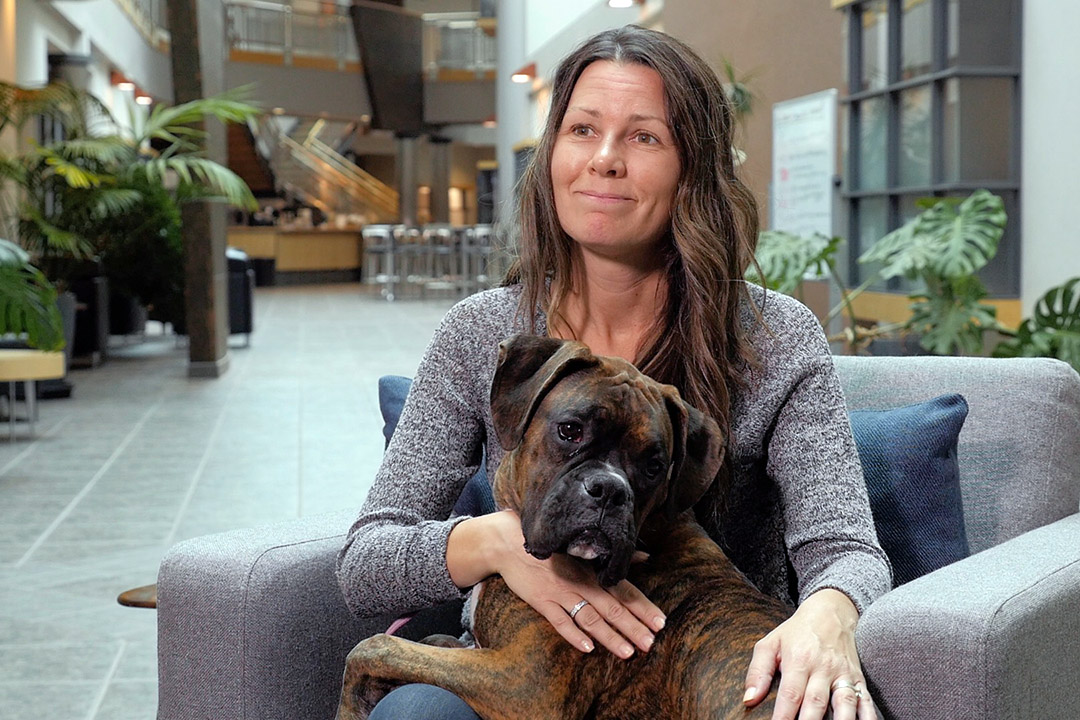
Animal Memories magazine highlights many benefits of animal-assisted interventions with inmates
Animal Memories, a new online magazine, shares the stories of inmates and their animal companions, as well as profiles of animal-assisted intervention (AAI) programs within five of Correctional Service Canada’s (CSC) facilities.
This magazine is the first-ever to explore animal-human bond research evidence and practice in a Canadian correctional environment, including several diverse AAIs, and personal animal memories from inmates themselves.
The magazine is the product of a project led by Dr. Darlene Chalmers (Phd) of the Faculty of Social Work at the University of Regina Saskatoon Campus and Dr. Colleen Dell (Phd), a professor of sociology in the College of Arts and Science and Research Chair in One Health and Wellness at the University of Saskatchewan (USask), along with a community-based ‘Kickstarter’ initiative with the CSC’s Citizen Advisory Committees (CAC) and CSC officials.
“I want to express my sincere gratitude to the volunteers, staff and community partners involved in the Animal Memories project. These stories are strong examples of how providing offenders with creative, educational, and skill-building activities supports safe and effective reintegration,” said Anne Kelly, Commissioner, Correctional Service of Canada.
“This tremendous adventure focused on the animal-human bond and its “pawsibilities” in our federal corrections system. It is grounded in the team bond it inspired among CAC volunteers, researchers, community partners, CSC, and inmates willing to share personal stories. Together, we have unleashed something truly special!” said Lori Ebbesen, Citizen Advisory Committees, National Chairperson 2016-2018.
The beneficial role of companion animals for human health includes enhanced feelings of happiness, safety, self-esteem and reduced depression, anxiety and stress. AAI involves a variety of animal species, primarily dogs, in a manner beneficial to human health, and is increasingly available at correctional facilities across the U.S., Canada, and beyond.
“This project adds to the growing evidenced-based research that AAIs provide a positive mental health support for inmates in correctional facilities,” said Chalmers. “It also raises awareness about how an inmates’ past and present relationships with animals can support their mental health. Central to our approach is recognition of the reciprocal beneficial relationship for the inmates and dogs.”
With seed funding from the CAC Kickstarter project and support from Dell’s USask Centennial Enhancement Chair in One Health and Wellness, the project was an opportunity to leverage the ongoing research led by academic partners and the existing community-led intervention programs held in CSC institutions. Compelling stories, artwork, photos and poetry invited from inmates are also featured prominently in the magazine.
“This magazine captures our key learnings from these inmates and animals. It shares the latest research about the benefits of the human-animal bond and allows us to present it to a broader audience including government officials, staff and other policy and decision makers in the field of corrections,” said Dell. “Critical to implementing AAIs within correctional facilities, or elsewhere, is ensuring the animal’s welfare is also considered and addressed.”
The various AAI programs discussed in the magazine highlight the work of dogs that have undergone temperament and obedience testing. These include the St. John Ambulance Therapy Dogs at Stony Mountain Institution in Manitoba and the Regional Psychiatric Centre in Saskatoon; service dog training at Nova Institution, in Nova Scotia; and the PAWSitive Support Canine Assisted Learning program at Drumheller Institution in Alberta. An animal memories exercise in the educational classroom at Matsqui Institution in British Columbia was also held.

